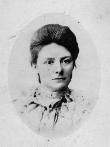Sesca Lewin was the third child of Charles Lewin and his wife Elizabeth (Davis). Her father was a nephew of the painters John William Lewin and Thomas Lewin. He was an Officer in the Convict Dept, Special Constable for the Province of SA, a mounted policeman, and later was licensee with his wife of the Green Dragon Hotel, Pulteney St, Adelaide. The family lived at the Talisker Mine on the Fleurieu Peninsula when Charles was the policemen stationed there, and on one occasion Sesca and her brother, as small children, were lost in the bush. She never forgot this experience, and it inspired her prize-winning poem 'Lost in the Bush' . They later lived at Norwood, and then at the Green Dragon Hotel.
Her father died in 1867 and her mother remarried. Sesca, with her older sister, became a teacher with the SA Education Department, studying at the University of Adelaide. She went as a pupil teacher to Hamilton, near Kapunda, and taught at other schools including Parkside and Goodwood. In 1888 she was living at her stepfather's house, 'Egerton', at St Mary's. In 1894 she married the clerk and accountant Archibald Somerville, who had come to SA from Scotland in 1871, and she retired from teaching, as was required at the time. They had 6 children in 6 years, including twins. They lived in Malvern.
At the request of Dr Charlton, Director of Education and Sunday School Superintendent of the Malvern Methodist Church, she took the young men's class there, with 20-30 young men, including her eldest son and her nephew. These young men all volunteered as servicemen in WWI. Before they went she had individual photos taken of them and mounted in one huge frame which had pride of place in her dining room until she died. Most of these men kept in touch with her for many years; some, all their lives.
Sesca was keenly interested in literature, and enjoyed reciting dramatic poems on social occasions. She contributed many stories and poems to the Education Dept's publication, The Children's Hour, both before and after marriage, and contributed to the Literary Societies' Union's Year-Books, her poems winning first prize in 1884 and 1888, and second prize 1885. She contributed poems, short stories and articles to magazines and newspapers and wrote poems on request for special occasions such as the unveiling of the Arch of Remembrance at the Brighton jetty. She did translations from the German for the Liedertafel, and also wrote verses set to music. She was an active member of the Ornithological Society, and was a member of the Lyceum Club.
She and her husband moved to 'Araluen', on the Esplanade, Brighton, in 1924 and she lived there until her death in 1946. She was widowed in 1936. Of her children, the eldest, Sesca, was a brilliant classics scholar and was one of the first women to be invited to lecture at the University of Adelaide (she did not take the position but married instead), Dorothy was the third woman to be admitted to the Bar, Archibald became a solicitor at Lameroo, one of the twins died young, and the other, Athol, was an accountant and married Phyllis Ham (Phyllis Somerville), author of Not Only in Stone.

